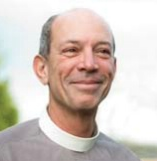Yesterday morning five people gathered on a quiet point overlooking a pond in Delaware. As the sun rose over the salt marsh, a 180 degree panoramic view of the marsh, the spillway, the trees and fields, and more of the pond came into view. Geese and birds honked and sang in increasing numbers. Music from a CD of ancient Native American voices played in the background.
Our Native American Service of Holy Communion began with the five of us facing the four directions: Facing East and the gold of the morning star, we prayed for balance of mind and far-sighted vision.
Turning to the North we prayed for balance of our bodies, a good sense of humor, innocence, trust and love. We prayed that we might behold the sacredness of every living thing.
Facing West we prayed for balance of our emotions in the spirit of Gentleness and Honesty.
Turning South we prayed for the balance of our spirits in harmony with our brothers and sisters.
Finally, we turned to complete the circle and to imagine God's love and mercy in all things. We learned that many native peoples did not resist newcomers from Europe when they first arrived centuries ago; they adapted native beliefs with what non-native peoples taught them. What emerged was the image of a loving God, a God who bent the earth like a bow until it was one, round, shining planet. God's word became the land: mountains, deserts, forests and plains. God gathered waters into rivers, lakes and seas. God's creation was sacred, and people lived in harmony with creation. Non-native people crossed the sea in hopes of settling the already settled land. These pioneers broke the circle of God's creation by their greed and violence, and even though they sometimes shattered the lives of native peoples, God renewed the circle of the earth and turned the hearts of native and non-native toward one another.
One student read a story from the Gospel of Luke. It was the story of Lazarus, a rich person who did not pay attention to those less fortunate than he, not even when their deep suffering was right at his door. When Lazarus died, he was confronted by Father Abraham for his lack of compassion on those who suffered at his door. Abraham was unable to offer Lazarus any comfort, even though Lazarus was now suffering. Basically he said that it was too late to save those who had used up their chances to heed the warnings of the prophets who came before.
The young woman who read the passage became upset by what she read; she could not accept the idea that Lazarus would be condemned to eternal suffering.
Quietly, the five of us began to talk about the story in the context of what our Native American ancestors had to say about living together in harmony, about honoring the Great Spirit, about looking towards Grandmothers and Grandfathers for inspiration and guidance as to how we should be treating the earth and all that lives upon it, and also one another.
We began to imagine that the story of Lazarus is not unlike what our ancestors pointed to as "the ancient way," and we began to wonder if the story did not parallel what could be the end result of our way of life if we do not begin to take better care of the earth and all that live upon it. Perhaps God is calling us, we wondered, to listen to the oceans, the land, the mountains, and the wild animals, birds and fish who say, "Pay attention, brothers and sisters, before it is too late."
We prayed. And the sun rose golden. As we broke bread together, the words of an Ojibway prayer came to mind:
Grandfather, look at our brokenness. We know that in all creation only the human family has strayed from the Sacred Way. We know that we are the ones who are divided, and we are the ones who must come back together to walk in the Sacred Way. Grandfather, Sacred One, teach us love, compassion, and honor that we may heal the earth and heal each other.

No comments:
Post a Comment